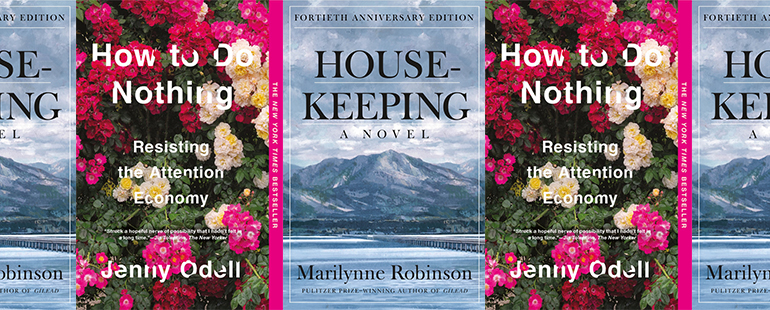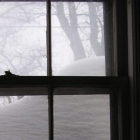States of Refusal in How to Do Nothing and Housekeeping

Fourteen years ago I left my editorial job at a publicly traded company and began life as a freelancer. Sometime within the next two years, during which I gave birth to my older child, I began to tell myself a story about how I had “dropped out”—a story that made sense out of the disconnection I felt from the daily churn of the regular workaday world, in which I had participated for more than a decade. Instead of shuttling on a packed train to and from an office in Manhattan, I sat with a napping baby on my lap and listened to Music Has the Right to Children or Music for 18 Musicians (whether to calm the baby or myself, I am no longer certain) while I wrote multiple-choice questions or reviewed pages or did whatever editorial piecework was due next. At times—most often when I was out on a mid-morning run around Prospect Park with the baby in a stroller—I felt that I was getting away with something, as though I were playing hooky. At other times, I simply felt exhausted—working while the children napped, which meant that I was desperate for the children to nap, and also working in the hours after the children went to bed, often into the early morning. Nearly all of the time, too, I felt lonely.
In all these years I have been trying to get to what in How to Do Nothing: Resisting the Attention Economy (2019) Jenny Odell calls the “third space,” an arena of both participation in and resistance to society. One enters this space via “a commitment to live in permanent refusal, where one already is, and to meet others in the common space of that refusal. This kind of resistance still manifests as participating, but participating in the ‘wrong way’: a way that undermines the authority of the hegemonic game and creates possibilities outside of it.” Certainly whatever I’ve been doing (mothering, working, writing), I’ve felt that I was doing it the wrong way; given the scarcity of paid maternal leave (any time off I ever had I paid for myself, from my savings) and expense of child care, our society is not constituted for mothers to feel otherwise. And now, in middle age, the interruptions of the pandemic rendering me unable to do and earn what I once was able to do and earn, I wonder if all that I’ve undermined is myself. Perhaps I never dropped out; perhaps I dropped into the place right where society as it is still structured expects white women to reside, doing the necessary, unpaid labor of care at home.
Odell’s explanation of how to find the “third space” includes a discussion of “Bartleby, the Scrivener.” She cites Gilles Deleuze’s insight that Bartleby’s famous refusal, “I would prefer not to,” is not a simple refusal to do anything; it is, rather, a refusal that invalidates the requests of the narrator, his boss: “Not only does he not comply; he refuses the terms of the question itself.” I’m not sure what to make of the example of Bartleby, though. On one hand, I am envious of his audacity in actually stating his preference not to—and then stubbornly following through on this preference. At first, Bartleby’s refusals seem to carve out a space in which his job responsibilities are in accord with his preferences: he copies documents, but he refuses to check copies or go on odd errands, such as to the post office. On the other hand, I find his refusals, in the end, as inscrutable as the narrator does. Why refuse even to eat, as Bartleby eventually does, in prison? Such a refusal would seem neither to manifest as participation, nor to create any possibilities.
What is most significant to me about Bartleby, though, is that his is (according to the story’s subtitle) “a story of Wall Street,” and that the arena of his refusals is public: first, in the workplace, and later, in jail. Among his refusals, in fact, is a refusal to leave the office. “I observed that he never went to dinner; indeed that he never went anywhere. As yet I had never of my personal knowledge known him to be outside of my office,” says the narrator, and one Sunday morning he discovers that Bartleby is actually living there—sleeping on a sofa and subsisting on ginger-nuts and cheese. There seems to be no domestic space to which Bartleby can retreat; instead, he maintains his private life entirely within his own person, refusing to admit even to any familial connections. And so his refusals are intolerable for those around him not only because they are so absurd and incomprehensible, but also because he is always there, refusing to do what everyone else around him is doing for no better reason than he would prefer not to. Insofar as Bartleby is a dropout, he drops out in sight of everyone, embarrassing his onetime employer with the spectacle of his intransigence. Ironically, it is because of his immobility—he refuses to leave the office even after he has decided to give up copying, and even after the narrator moves his business to other premises—that Bartleby is finally sent to prison for the crime of vagrancy.
I preferred not to go to the office, and so I became a freelancer: a worker, but out of sight in the domestic sphere—the inverse of Bartleby. What, then, does it mean to “participate in the ‘wrong way’” here in the domestic sphere? Because I have long been obsessed with its portrayals of domestic life, this question brings to mind Marilynne Robinson’s gorgeous, sorrowful, and unsettling first novel, Housekeeping (1980), in which the narrator, Ruth, and her aunt Sylvie ultimately abandon the house that Ruth’s grandfather, Edmund Foster, built on a hill in Fingerbone, an Idaho town on the edge of a lake that sometimes floods the town, and in which both Ruth’s grandfather (in a train accident) and her mother (by suicide) drowned. Like Bartleby’s, Ruth’s is a story of refusals, but the site of her refusals is mainly in a small-town home.
One passage that I often return to with longing comes early in the book, when Ruth describes how her widowed grandmother cared for her three daughters, Ruth’s mother and aunts:
She had always known a thousand ways to circle them all around with what must have seemed like grace. She knew a thousand songs. Her bread was tender and her jelly was tart, and on rainy days she made cookies and applesauce. In the summer she kept roses in a vase on the piano, huge, pungent roses, and when the blooms ripened and the petals fell, she put them in a tall Chinese jar, with cloves and thyme and sticks of cinnamon. Her children slept on starched sheets under layers of quilts, and in the morning her curtains filled with light the way sails fill with wind.
I have longed to be such a mother, bestowing such grace—or what seems like grace—upon my children; my odd hours and my husband’s long hours leave us with little time to tend properly to our dusty, clutter-filled home. At the same time, I have puzzled over what went wrong in the Foster household, making the three daughters depart so abruptly—the eldest, Molly, to a self-imposed exile as a missionary in China; the next oldest, Helen, to a disapproved-of marriage and then suicide; and the youngest, Sylvie, to life as a transient. According to Ruth, in the serenity of ordinary life in the years after the death of her husband, her grandmother was “lulled . . . into forgetting what she should never have forgotten”—the shock to her daughters of the sudden loss of their father. Her daughters were silent, and she watched but did not inquire into “the calm inwardness of their faces,” as apparently placid as the surface of the lake under which their father’s body lies. In the person of Ruth’s grandmother, Mrs. Sylvia Foster, then, the domestic arts are found to be insufficient; her daughters, and later her granddaughters, Ruth and Lucille, whom she cared for after their mother Helen’s death, needed her to acknowledge their losses. Rather than giving solace to their grief, as I tend to imagine that tender bread and tart jelly might do, her housekeeping was a form of spiritual bypassing—an effort to keep sorrow, like dust and decay, at bay. Actual grace, the grace I long for, can take in sorrow, fragility, and all else that is messy or “wrong” in human life.
After the death of Ruth’s grandmother, her youngest daughter, Mrs. Sylvia Fisher (who is called “Sylvie” and who can give no account of the whereabouts of her husband, Mr. Fisher), comes to Fingerbone to take care of Ruth and Lucille. Though they share a first name, the daughter is an inversion of the mother. Sylvie’s housekeeping is haphazard, deranged—it keeps nothing out. Leaves and scraps of paper gather in the corners of rooms; she opens doors and windows to air out rooms, and then neglects to close them; she collects stacks of newspapers, brown bags, bottles, and cans; and, to combat the mice that might nest in such collections, she takes in a pregnant cat, whose dozen or so progeny eventually roam through the house, leaving parts of the birds they have caught in the parlor. Under Sylvie’s care, the house is permeable to the wilderness; noting that her aunt likes to eat supper in the dark, Ruth observes that Sylvie prefers a house “sunk in the very element it was meant to exclude.” One evening, Lucille suddenly turns on the lamp, which in its harsh light exposes the deterioration of what was once a (seemingly) graceful home:
We saw that we ate from plates that came in detergent boxes, and we drank from jelly glasses. . . . The tables and chairs and cupboards and doors had been painted a rich white, layer on layer, year after year, but now the last layer had ripened to the yellow of turning cream. Everywhere the paint was chipped and marred. A great shadow of soot loomed up the wall and across the ceiling above the stove, and the stove pipe and the cupboard tops were thickly felted with dust. Most dispiriting, perhaps, was the curtain on Lucille’s side of the table, which had been half consumed by fire once when a birthday cake had been set to close to it.
The word dispiriting here is especially apt; in such a home I would feel deeply uncomfortable. And then I wonder just how comfortable I feel in my similarly (though not so extremely) disordered home.
But no wonder my home is so disordered; like Sylvie, I let things in and let boundaries blur. I do my jobs (I often have several) at home, sometimes at the table where we eat our meals, and sometimes at the desk where I also write poems and essays. The poems and essays, too, come to think of it, sometimes get written at the table where we eat, as well as at the coffee table, while I’m sitting on the couch. I preferred not to go to the office in part because I wanted an integrated life, and though I wish that such a life could be beautiful and calm, as in Ruth’s grandmother’s home, the reality is far wilder, encompassing the big feelings of my family, and our noise, confusion, disappointments, and losses. Odell sees the third space as created by refusals; the refusals, then, can create a space in which such wildness can be held. Of course it isn’t comfortable; nor, I suppose, is it productive, at least in any conventional sense. I was raised to put my feelings aside (and go without sleep, too) to get my work done, and all these years later I am still trying to take care of the resulting damage and unlearn the habits that that attitude instilled in me. Though I am at present less clear than Odell on how to go about living according to an anti-capitalist vision (particularly, I will admit, in how to extend that vision beyond my own home), I share in her vision and strive for myself and my children for our home to be—rather than a private cog of the capitalist machine—a place where, for example, imagination and emotional care are cultivated rather than production, consumption, and achievement.
Ruth and Sylvie, of course, have no interest in such things as achievement, and however cluttered with old newspapers and dead bird parts their home might be under Sylvie’s care, at least there is room enough there for Ruth’s losses to be perceived and accepted. “Really, she’s all right,” Sylvie tells a group of concerned ladies who come to suggest that Ruth might need a more orderly life (Lucille, who Ruth says is “of the common persuasion,” has by this time gone to live with the home economics teacher). “She should be sad,” Sylvie continues. “I don’t mean she should be, but, you know, who wouldn’t be?” But, in the view of the concerned ladies, Ruth has been permitted far too much: she wanders in the woods instead of attending school, she and Sylvie steal a boat to go explore a lake island, and they jump on a freight train to get a quick ride back home after staying out on the lake all night long. Ruth and Sylvie’s indifference to norms is intolerable to the ladies of Fingerbone, and the ladies have the sheriff on their side. Facing the likelihood that the state will intervene in the raising of Ruth, she and Sylvie leave town after a failed attempt to burn the house down.
And so in the end, neither Bartleby nor Ruth and Sylvie are permitted to dwell in the third space. Though he occupies an office, Bartleby refuses to behave as a proper office worker, and he is deemed a vagrant and sent to prison, where he dies. Though they occupy a house in a town, Ruth and Sylvie refuse to keep house in any ordinary way, spending more time outdoors than in, keeping odd hours, and (on Ruth’s part) more or less dropping out of school, and they choose a life of vagrancy rather than be separated from each other. Odell recognizes that some social or financial support (or both) is needed to maintain the third space, but Ruth, Sylvie, and especially Bartleby are characterized by their isolation. Too, their behavior reinforces their isolation—to such a degree that both Bartleby and Ruth choose hunger. Bartleby starves to death, and after leaving Fingerbone Ruth can hardly maintain a job serving others at a truck stop: “What have I to do with these ceremonies of sustenance, of nurturing? They begin to ask why I do not eat anything myself,” she says. Why Bartleby chooses hunger (or does anything at all, for that matter) is never clear; it may simply be that he is depressed. “At present I would prefer not to be a little reasonable,” is my favorite of all his refusals—how wild and free, to prefer not to be a little reasonable!—but the narrator characterizes the tone of this reply as “mildly cadaverous,” so Bartleby’s state of mind is perhaps not so wild and free. Why Ruth chooses hunger (or what Yale professor Amy Hungerford calls an “anorexic aesthetic”) is clearer: she chooses it in the face of loss—first of a mother, then a grandmother, and finally her sister.
“It is better to have nothing,” concludes Ruth after observing that “the appearance of relative solidity in my grandmother’s house was deceptive. It was an impression created by the piano, and the scrolled couch, and the bookcases full of almanacs and Kipling and Defoe. For all the appearance these things gave of substance and solidity, they might better be considered a dangerous weight on a frail structure.” She might as well be talking about all of Western civilization or those so-called Great Ideas that Marilynne Robinson once suggested we should be a little skeptical about. Unlike Ruth, though, I would not prefer to have nothing. I choose sustenance, and to nurture my family, and to keep a home—though striving to clear it, insofar as it can be cleared, of all that dangerous weight, so that there may be space here for a life more obviously provisional, and messy, and wild.
This piece was originally published on June 14, 2021.



